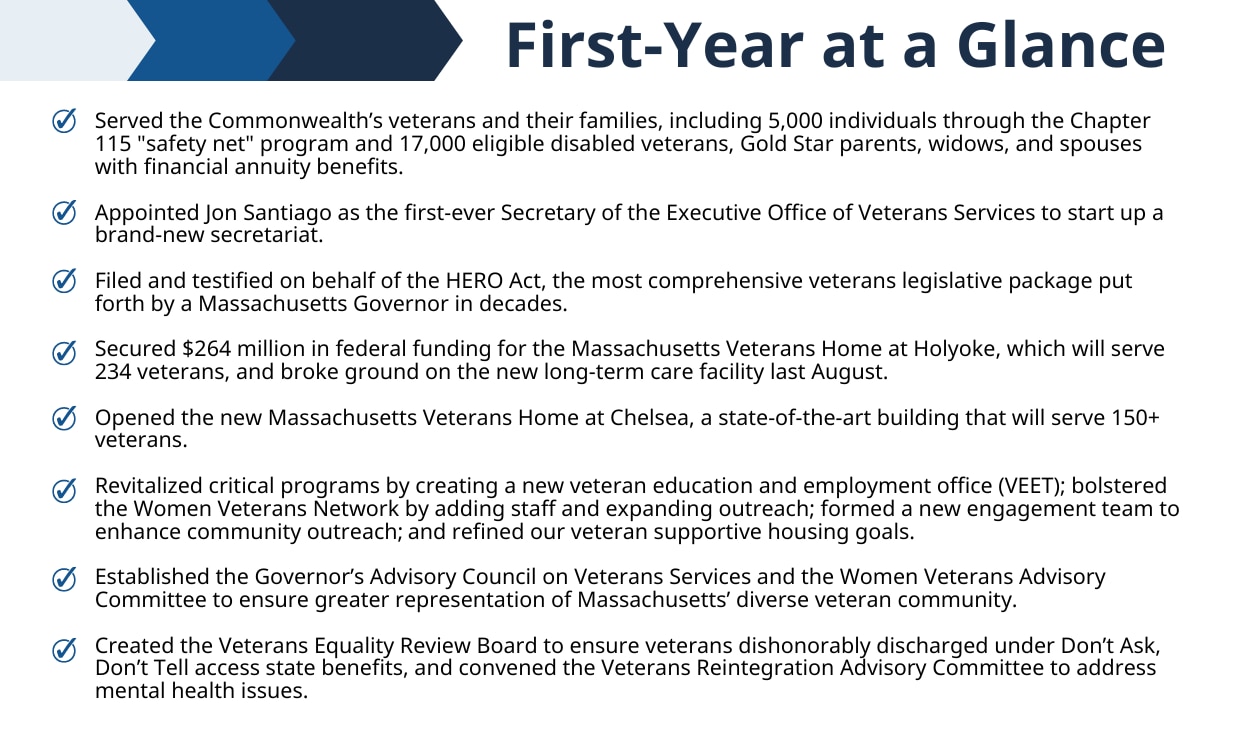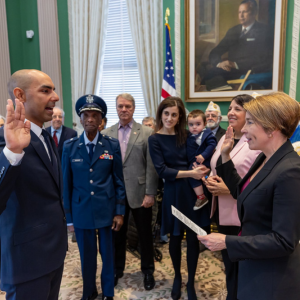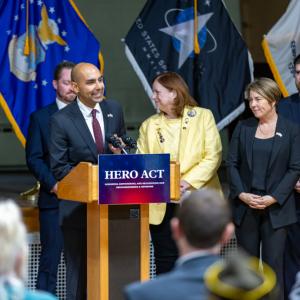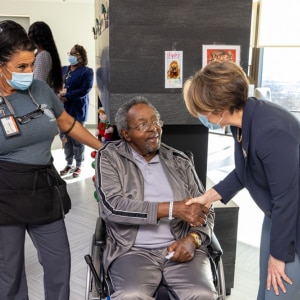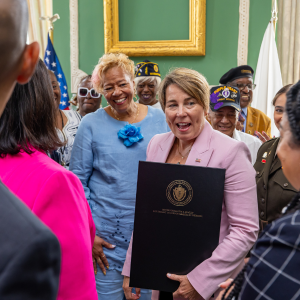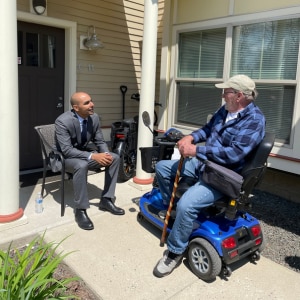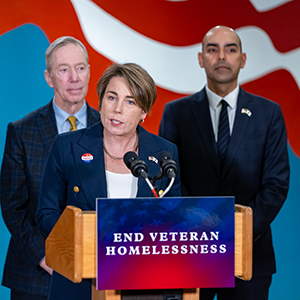Building and Transforming Veterans Services
Our mission is to Honorably Serve Those Who Served Us.
Establishing a Cabinet-Level Secretariat and Transforming Operations
- In March 2023, Governor Maura Healey appointed the state’s first-ever Secretary of the Executive Office of Veterans Services, Jon Santiago, to build and transform a cabinet-level secretariat focused on veterans care.
- A major emphasis has been placed on building capacity and streamlining efforts to create efficiency and accountability.
Revitalization of Programs and Services
- Created a new veteran education and employment training office (VEET).
- Bolstered the Women Veterans Network by expanding staff, including hiring a Director.
- Made significant strides in refining programs and created the Supporting and Empowering Reintegration for Veterans Equality (SERVE) program to better target their impact across peer support and justice-involved veteran communities.
- Created a brand-new Engagement Office within the Executive Office to engage with every aspect of veterans services in the Commonwealth.
- Strengthened our partnership with the U.S. Department of Veterans Affairs (VA).
Funding and Annuity Benefits
- Allocated nearly $21 million dollars in support to more than 5,000 individuals through the Chapter 115 "safety net" program, providing vital economic assistance for necessities such as food, shelter, clothing, fuel, and medical care.
- Disbursed over $36 million dollars in annuity benefits to over 17,000 eligible disabled veterans, Gold Star parents, widows, and spouses.
Hero Act
Honoring, Empowering, and Recognizing our Servicemembers and Veterans
In November 2023, Governor Healey filed H.4172, Honoring, Empowering, and Recognizing our Servicemembers and Veterans, otherwise known as the HERO Act. The HERO Act is the most comprehensive veterans legislative package in a generation, consisting of 17 proposals to expand veteran benefits, promote equity and inclusion, and modernize our services.
Benefit Expansion
- Increases the Disabled Veterans Annuity
- Increases access to behavioral health treatment
- Expands compensation to 100% disabled veterans and dependents
- Creates a tax credit for local businesses that hire veterans
- Expands eligibility period for veterans to buy back active duty time
- Grants local municipalities flexibility to double veteran property tax exemptions
- Eliminates fees on specialty veteran license plates
Inclusivity
- Expands the definition of veteran to allow for certain increased benefits
- Broadens the criteria for certain veterans wrongfully discharged to apply for state benefits
- Expands the definition of veteran-dependent
- Creates a pilot program for same-sex couples denied VA benefits for IVF treatment
Modernization
- Codifies mental health and dental assistance benefits
- Grants EOVS the authority to operate two state veteran cemeteries
- Studies the use of alternative therapies for mental health issues among veterans
Caring for our Veterans
One of the biggest priorities in our first year at EOVS was to transform, professionalize, and enhance care for residents at our two Massachusetts Veterans Homes at Holyoke and Chelsea.
Massachusetts Veterans Home at Holyoke
- Secured $264 million in federal funding to build a new Massachusetts Veterans Home at Holyoke, which will accommodate 234 long-term care beds, offering essential nursing support and community spaces.
- Maintained steadfast and vigilant compliance with infection prevention and control measure protocols.
- Made significant strides to completely implement an electronic medical records system, as well as achieve full U.S. Department of Veterans Affairs (VA) accreditation, with plans to secure accreditation in 2024.
Massachusetts Veterans Home at Chelsea
- Alongside VA Secretary Denis McDonough, opened the new Massachusetts Veterans Home at Chelsea, a transformative building that currently serves 150 veterans.
- Ushered in a new era at the Massachusetts Veterans Home at Chelsea with the hiring of Christine Baldini, LNHA, as our new Superintendent.
- Became certified by the Centers for Medicare and Medicaid Services and licensed by the Department of Public Health as a nursing home.
- Earned a 2024 Pinnacle Customer Experience Award, scoring top 15% in the nation amongst a survey program within our resident family members.
- Plans are underway to build and expand veteran housing opportunities on the current domiciliary site to create independent, veterans preference housing and supportive services. The phased redevelopment project will update the campus through a combination of rehabilitation and new construction to better meet the needs of veterans and their families. This will include 220+ units of mixed-income affordable housing with 100% veterans’ preference with supportive services.
Commitment to Inclusivity and Representation
Commitment to Diverse Veteran Representation
-
Appointed 25 members to the Governor's Advisory Council on Veterans Services to ensure greater representation of Massachusetts' diverse veteran community, including geographic region, race, ethnicity, gender identity, sexual orientation, ability, immigration status and economic status.
Providing Inclusive Veteran Services
-
Five members were sworn in to serve on the Veterans Equality Review Board (VERB). The board’s goal is to provide an application process for veterans to receive state benefits who received an “other than honorable discharge” due to discrimination, including from the former “Don’t Ask, Don’t Tell" (DADT) policy.
Improving Outreach and Advocacy for Women Veterans
- Hired a new Director of the Women Veterans Network to enhance our operations and increase engagement within the network.
- Appointed 16 members to the Advisory Committee on Women Veterans, demonstrating a commitment to prioritizing and advocating for the needs and rights of women veterans within the Commonwealth.
Mental Health and Suicide Prevention
We are committed to addressing the mental health disparities within the veteran community.
Addressing Veteran Mental Health
-
Convened the Veterans Reintegration Advisory Committee (VRAC) to examine and provide recommendations for preventing suicide among veterans, to improve and support behavioral health among service members, veterans, and their families, and to assist veteran reintegration into society.
Delivering on Promises and Finding Solutions
- VRAC recently finished a report to submit to the Legislature, which consists of strategies for addressing suicide among servicemembers, veterans, and their families and how to establish and facilitate programs and services that address mental-health-related issues.
- Formed a cross-secretariat mental health and suicide prevention working group.
End Veteran Homelessness
In March 2024, we announced our commitment to making the largest, targeted investment to address veteran homelessness in Massachusetts history. This cross-collaborative initiative prioritizes stable housing, access to behavioral health services, capital investments to support veteran housing, and provides financial and technical assistance to community providers.
Reaching functional zero
The goal behind the campaign is to make Massachusetts a state where veteran homelessness rates reach a level of “functional zero,” a federal term meaning a system where homelessness is rare, brief, and non-recurring. It involves ensuring that there are enough resources and support services available to quickly identify and assist individuals or families experiencing homelessness, ultimately leading to their swift placement into stable housing. A number of Massachusetts cities and counties have achieved “functional zero,” including New Bedford, Lowell, and Lynn.
How we're getting it done
Utilizes $20 million ARPA funds to invest in veteran homelessness services and housing infrastructure, ensuring that resources are equitably distributed across the state via five pillars:
- Investing in homelessness outreach, housing placement, and wrap-around services.
- Providing Capital Investments to Support Veteran Housing
- Aligning Supportive Services with Veteran Housing Goals
- Creating an End Veteran Homelessness Advisory Council
- Empowering and Supporting our Veteran Service Providers
The Year Ahead
Stay tuned for exciting announcements and initiatives related to veteran homes and housing, women veteran network, and mental health and suicide prevention.
